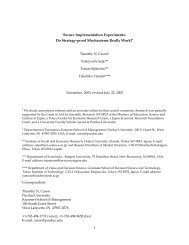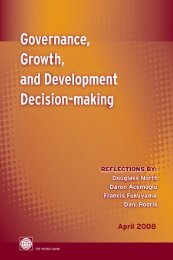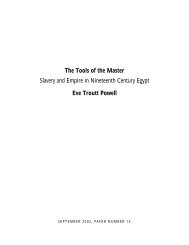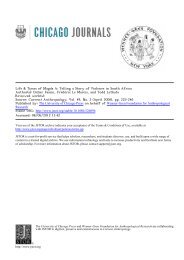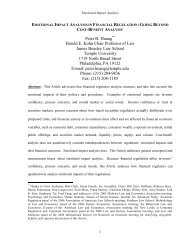Compassion and Repression: The Moral Economy of Immigration ...
Compassion and Repression: The Moral Economy of Immigration ...
Compassion and Repression: The Moral Economy of Immigration ...
You also want an ePaper? Increase the reach of your titles
YUMPU automatically turns print PDFs into web optimized ePapers that Google loves.
IMMIGRATION POLICIES IN FRANCE 369<br />
In 1981, 20,000 foreigners sought asylum in France; out <strong>of</strong> these, 80 percent<br />
were recognized as refugees. In 1999, 30,000 applied for the same status under<br />
the Geneva Convention; however in that year, 80 percent were rejected (OFPRA<br />
1996, 2004). Within less than two decades, the attitude <strong>of</strong> public authorities had<br />
completely reversed, from relative tolerance to general mistrust. This evolution<br />
became particularly clear at the end <strong>of</strong> the 1980s, a time when the political changes<br />
in Eastern Europe <strong>and</strong> the regional conflicts in the former Yugoslavia generated<br />
massive migrations toward Western Europe, tripling the number <strong>of</strong> asylum seekers<br />
between 1988 <strong>and</strong> 1990 (Berger 2000). Meanwhile, the National Front, an extremeright<br />
xenophobic party, developed an aggressive rhetoric denouncing an “invasion”<br />
<strong>of</strong> France by immigrants from the South <strong>and</strong> grew in electoral significance from<br />
less than one percent <strong>of</strong> the vote in the early 1980s to 14.4 percent in the 1988<br />
presidential election (Hargreaves 1999). Within this new political context, the<br />
number <strong>of</strong> foreigners benefiting from political asylum decreased sixfold in France<br />
during the 1990s, gradually stabilizing at around 2,000 refugees per year, not<br />
counting children who automatically became refugees on reaching the age <strong>of</strong> 18<br />
(Legoux 1999). This decrease corresponds to two distinct trends sharing a common<br />
logic: the number <strong>of</strong> claims submitted was reduced by two-thirds <strong>and</strong> the proportion<br />
<strong>of</strong> accepted claims was halved.<br />
Considering the international situation during this period, it would be hard to<br />
argue that this dramatic drop in the number <strong>of</strong> refugees had resulted from a reduction<br />
<strong>of</strong> conflict in the world. Rather, it is the consequence <strong>of</strong> two phenomena: first,<br />
at all possible entrances to French territory, border <strong>of</strong>ficials were turning away an<br />
increasing number <strong>of</strong> potential asylum seekers before they could file their cases<br />
(Julien-Laferrière 2002); second, the civil servants who evaluated the claims were<br />
determined to lower the percentage <strong>of</strong> acceptances (Teitgen-Colly 1999). As a consequence<br />
<strong>of</strong> deep changes occurring in popular attitudes toward asylum, explicit<br />
orders had been given by the Ministries <strong>of</strong> the Interior <strong>and</strong> Foreign Affairs to their<br />
respective administrations, <strong>and</strong> police <strong>of</strong>ficers in the airports <strong>and</strong> bureaucrats <strong>of</strong><br />
OFPRA have come to view asylum seekers with systematic suspicion: all c<strong>and</strong>idates<br />
for refugee status are now considered, until there is evidence to the contrary,<br />
to be undocumented immigrants seeking to take advantage <strong>of</strong> the generosity <strong>of</strong> the<br />
European nations. Use <strong>of</strong> the expression “false refugees” to refer to “economic immigrants”<br />
who claim political asylum has become central to bureaucratic common<br />
sense (Valluy 2004). <strong>The</strong> Geneva Convention is thereby implemented in a more<br />
<strong>and</strong> more restricted way by governments who declare that it should be rewritten.<br />
In contrast, during the same period, another category <strong>of</strong> immigrants were<br />
increasingly being granted residence permits: those with health problems, or more<br />
precisely, with severe pathologies for which they had no access to proper treatment<br />
in their home countries. This new criterion is <strong>of</strong>ficially designated as “humanitarian<br />
reasons” (Lochak 2001). It was invented in the early 1990s in response to pressure<br />
from medical NGOs like Médecins Sans Frontières <strong>and</strong> Médecins Du Monde but<br />
also from human rights associations who found themselves confronted by patients



